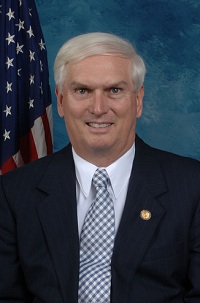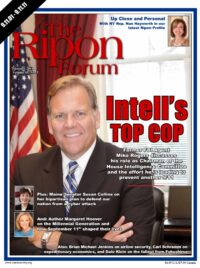
Dwight Eisenhower is looking better all the time.
All he did was give us peace and prosperity.
During his eight years in office, inflation averaged 1.3%, growth 2.3%, unemployment 4.9%, and the National Debt blipped up by less than one percent instead of jumping by leaps and bounds like today.
Yet his most important contributions were in foreign policy. He brought the Korean conflict to conclusion. He resisted pressure to go to war in other places such as the Suez and Indo-China.
Having spent his career mostly in uniform, he loved the military, but hated war.
In probably his most famous speech, his farewell address to the Nation, he said: “In the councils of government, we must guard against the acquisition of unwanted influence, whether sought or unsought, by the military-industrial complex. The potential for the disastrous rise of misplaced power exists and will persist.”
He even reduced military spending and substantially reduced the size of our armed forces.
Today, fewer than 22% of the current Congress has ever served in any branch of the military.
Most of the non-veterans seem to be afraid to question anything the Pentagon wants or does for fear of being called unpatriotic.
This has led us into some very costly misadventures in Iraq, Afghanistan and Libya—costly in terms of both blood and treasure.
I am certain that President Eisenhower, with his experience and history, would never have involved us in a mess like Afghanistan in the first place.
I voted for the first gulf war after I attended several briefings and heard all our top officials talk about Saddam Hussein’s elite troops and the great harm that would come if we failed to act.
Then I watched those same elite troops surrender to CNN camera crews and empty tanks, and I realized the threat had been greatly exaggerated.
I began to question our later military actions more closely, and I and many others now have very serious doubts about our seemingly endless war in Afghanistan.
One columnist wrote a few months ago that “Afghanistan has little strategic value and the war is one of choice rather than necessity” and added that it has been a “wasteful and frustrating decade.”
General David Petraeus testified at one hearing that we should never forget that Afghanistan has been known as the “graveyard of empires.”
I am certain that President Eisenhower, with his experience and history, would never have involved us in a mess like Afghanistan in the first place.
And I am even more convinced that he would never have let such a war drag on like it has.
Traditional Republicans believe a nation should go to war only when there is no other alternative and then only as a last resort.
Evan Thomas, in Newsweek in 2008, wrote that recent leaders “have gone to extraordinary lengths to be seen as Churchill….”
The people of this Nation are peace-loving people, and we need to have presidents like Eisenhower who are not eager to go to war — presidents who do not have to get into unnecessary wars to prove that they are great leaders.
Hamid Karzai, the President of Afghanistan, told ABC News last year that the U.S. needed to be there another 15 to 20 years. But the truth is he really just wants all the mega-billions we are pumping in there.
Some have said that people like Barry Goldwater, Ronald Reagan, and William F. Buckley, would be seen as moderates in the Republican Party of today. Be that as it may, Mr. Buckley wrote something in 2005 that is very much applicable to the situation in Afghanistan today: “A respect for the power of the United States is engendered by our success in engagements in which we take part. A point is reached when tenacity conveys not steadfastness of purpose, but misapplication of pride.”
The people of Afghanistan have shown many times that they do not appreciate what we have done for them unless they are on our payroll.
In fact, our foreign policy in recent years has created more resentment around the world than respect.
On June 1, 2009, George C. Wilson, military columnist for the Congress Daily, wrote: “The American military’s mission to pacify the 40,000 tiny villages in Afghanistan will look like mission impossible, especially if our bombings keep killing Afghan civilians and infuriating the ones who survive.”
Foreign Policy magazine after the death of George Kennan described him as “the most influential diplomat of the 20th century.”
In a 1999 interview, Mr. Kennan said, “This whole tendency to see ourselves as the center of political enlightenment and as teachers to a great part of the rest of the world strikes me as unthought-through, vainglorious, and undesirable,”
George W. Bush, when he was campaigning for President in 2000, said that we needed a “more humble” foreign policy and that we should not engage in nation-building.
The historic Republican approach is that we be very slow to go to war and quick to end it, and that we make sure we do not neglect our own people and our Country in the process.
There is a very respectable position, a centrist position, between isolation and eagerly going to war.
It is the path to peace. It means encouraging trade and tourism, cultural and educational exchanges with other nations, and helping out to a limited extent during humanitarian crises.
But the historic Republican approach is that we be very slow to go to war and quick to end it, and that we make sure we do not neglect our own people and our Country in the process.
The foreign policy columnist Georgie Ann Geyer wrote a few years ago that “Americans, still strangely complacent about overseas wars being waged by a minority in their name, will inevitably come to a point where they will see they have to have a government that provides services at home or one that seeks empire across the globe.”
President Eisenhower, who gave us the Interstate Highway System, and led the way on Civil Rights for all people, took care of things at home first.
The Ripon Society, I believe, follows the traditional Republican Eisenhower path of peace and prosperity and a government that serves its people.
John Duncan represents the 2nd District of Tennessee in the U.S. House of Representatives.




